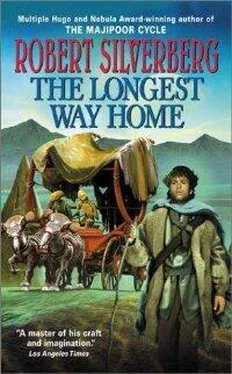Then the land began to improve again and on the third day they came at last to the Indigene village that was their destination. It was laid out much like the village where Joseph had been living before, tall conical buildings made from mud that had been thickly but irregularly plastered over a framework of interlaced laths and twigs, all of them set cheek by jowl in tight curving rows surrounding a central plaza that contained ceremonial buildings, with an agricultural zone forming a ring around the entire settlement. The layout was so similar to that of the previous village that Joseph half expected the Ardardin to come out and greet him here. But in place of a single chieftain this village seemed to have a triumvirate of rulers: at least, three dignified-looking older Indigenes, each of them clad in the same sort of painted leather cape and seashell-decorated leather skirt that the Ardardin had worn, presented themselves as Joseph was getting down from the wagon, and stood in aloof, somber silence, watching his arrival in a kind of bleak attentiveness, saying not a word.
The other villagers were considerably more demonstrative. Dozens of them, children and adults both, came running forward to swarm around Joseph. There was an endearing innocence to this unexpected enthusiasm. They pressed up close against him, narrow tubular heads butting at him like hammers, boldly bringing their faces within inches of his own, nose to nose. Their throat-pouches fluttered and swelled in flurries of spasmodic agitation. A few of the most courageous hesitantly put their hands for a moment or two to the dangling strips of his ragged clothing and lightly pulled at them, as though they found them amusing. As they encircled him they murmured excitedly to one another, but what they said was too indistinctly enunciated and too thickly colloquial for Joseph to be able to comprehend more than the occasional word.
One of them, carrying a little bag of woven cloth that contained a glossy black powder, solemnly poured some into the palm of its hand, dipped the tips of two long pliant fingers into it, and slowly and carefully rubbed a circle of the stuff onto each of Joseph’s cheeks. Joseph tolerated this patiently. He noticed now that the faces of most of the others were similarly adorned with patterns done in the black pigment, not just circles but in some cases whorls, triangles, crosses.
Ulvas, meanwhile, had entered into a conversation with a villager of substantial size and presence who, from the looks of things, was an important minister in the government of the triumvirs, though it was not clad in any of the symbols of authority itself. Joseph could not hear what they were saying, but it began gradually to become clear to him that what was taking place was not so much a conversation as a negotiation; Ulvas was the seller, the big villager was the prospective purchaser, and the primary topic of the conversation was the price that would have to be paid.
As for the commodity being sold, that, Joseph swiftly realized, was himself.
He was not meant to be a party to the transaction. The entire interchange was being carried on in low tones and quickly exchanged phrases, most of them words that were unfamiliar to him and all of it so rapid and cryptic that Joseph had no hope of following it. A good deal of the process was purely gestural. After each set of offers and replies the villager would go across to the triumvirate and report the details. This led to further palaver among the four of them, after which a signal would be given by one of the ruling three, and humbler citizens of the village came forth bearing merchandise: furs, beaded necklaces, bowls containing dried seeds and berries. Ulvas appeared to dismiss each offer as insufficient. New negotiations ensued, leading to new discussions between the rulers and their minister, and even more goods would be brought out: molded balls of vegetable meal, a brown bundle of dried meat, the blanched skull of some horned beast of the forest.
Ulvas was holding out for a steep price, it seemed. At one point there appeared to be a total breakdown of the dealings, huffy turning of backs, foreheads touched with splayed fingers in the emphatic gesture that meant negation. But perhaps all that was a signal of a climax in the negotiations, not a collapse; for almost immediately afterward came apparently conciliatory postures, signs of agreement, a series of new gestures clearly indicating that a deal had been struck. That seemed to be the case. Ulvas, Casqui and Paca began loading the wagon with the things that stood stacked all about in the center of the plaza.
The big minister signalled to Joseph in an unmistakable way. He belonged to them, now.
And now he knew just how little altruism, if indeed there had been any at all, there was in the Ardardin’s decision to pass him along to this neighboring village. The Ardardin had correctly seen that Joseph would be leaving its village as soon as he could; there was need of Joseph’s medical services at other Indigene villages along the route south; no doubt it had seemed merely efficient, rather than in any way morally virtuous, to provide a wagon to take Joseph on his way and simultaneously to turn a nice profit by selling him to the next village in the chain instead of just bestowing him upon them.
Ulvas and Casqui and Paca departed without a word to him. But Joseph had already learned not to expect sentimental leavetakings from these people.
His new hosts—his owners , Joseph corrected himself—showed him to his dwelling-place, a room much smaller than the one he had had before, and even more musty and dimly lit, with only a couple of tatty-looking fur rugs for his bed. On the other hand they had set out a generous meal for him, two bowls of their milky wine, an assortment of berries, stewed meats, and cooked grain, and a tray of knobby greenish-purple fruits of a kind he had never seen before. They were sour and tangy, not unpleasant, although after eating a couple he observed that the thick red juice of them had left his tongue puckered and the entire interior of his mouth very dry. He let the rest of them go untouched.
This settlement, too, had a backlog of medical tasks awaiting his attention in an infirmary set a little way apart from the village core. There were the usual sprained limbs and minor infections, which Joseph dealt with in the ways that had by now become familiar to him. One case, though, was more complicated. There had been a hunting accident, it seemed—the only other explanation, which he found too implausible to consider, was that one Indigene had actually attacked another—and the patient, a young male, had a small projectile point embedded in the upper right side of his back. Apparently this had happened some time ago, for the wound, though infected, had partly healed. No attempt had been made to extract the point. Joseph wondered how deep it was. The patient was in obvious distress: weak, feverish, barely coherent when Joseph questioned him. Joseph held his hand lightly over the wound and felt an insistent pounding throb beneath, as of something in there that must be let out.
Very well, he thought. I will operate.
Joseph had come to accept his own medical masquerade so thoroughly that he felt no compunction about taking this project on. The man lying before him must already be in great discomfort, which would only increase if nothing were done, and finally the infection would spread to some vital zone and cost him his life. Joseph asked for and received the assistance of the village’s master of herbal remedies, who at Joseph’s direction administered a steep dose of the pain-deadening drug to Joseph’s patient. He laid out his pitiful little collection of medical instruments, and cleansed the wound with a piece of cloth dipped in wine, which he hoped would have some antiseptic properties, and gently parted the healed section of the opening so that he could insert the tip of his knifeblade as a probe.
Читать дальше












